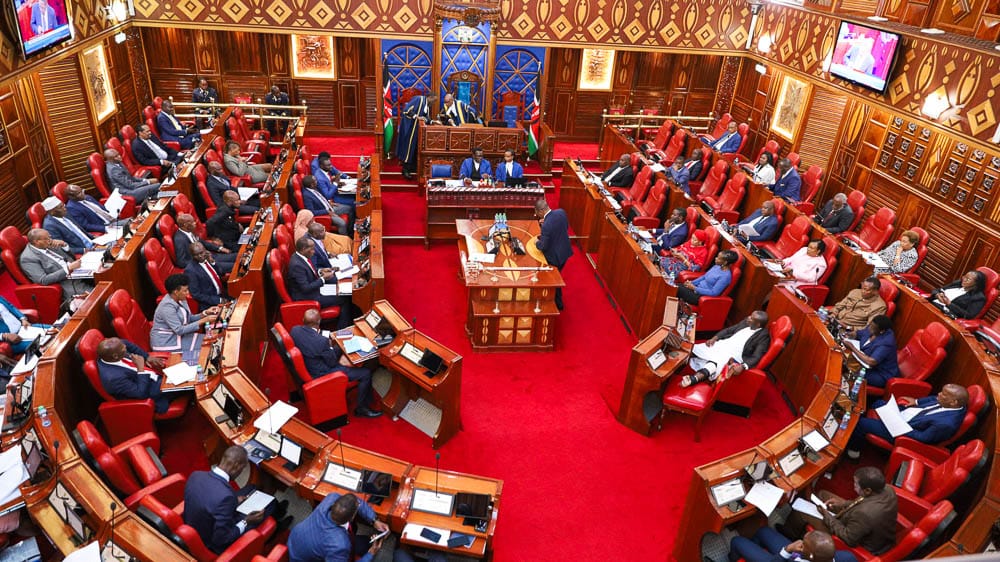Anti-graft Bill sparks showdown between Ruto and Parliament

According to the report by the Senate Justice and Legal Affairs Committee, only three of the 12 reservations proposed by the President should be accepted.
Tensions are rising between President William Ruto and Parliament as legislators move to block his attempts to enforce stricter rules on public officers doing business with the government.
Lawmakers are openly pushing back against the President’s proposals in the Conflict of Interest Bill, 2023, which seeks to bar public officers from conducting business with the government, among other radical reforms.
Despite Ruto’s attempt to reinstate clauses that were deleted or weakened by the National Assembly, MPs and senators are keen to retain the diluted version of the Bill.
The President had declined to sign the legislation after Parliament made several far-reaching changes, including scrapping key definitions and narrowing the scope of what constitutes a conflict of interest.
Now, a Senate committee has recommended rejecting most of the reservations raised by the President.
According to the report by the Senate Justice and Legal Affairs Committee chaired by Bomet Senator Hillary Sigei, only three of the 12 reservations proposed by the President should be accepted.
“The Senate fully accommodates the President’s reservations to clauses 30, 31 and 35 of the Bill but does not accommodate reservations to clauses 2, 5, 6, 8, 12, 16, 17, 18, and 20,” the report stated.
The accepted changes mainly involve clarity on terms such as “material change” in income declarations and defining the Ethics and Anti-Corruption Commission’s (EACC) role in verifying such statements. However, deeper reforms, especially those targeting the use of family and associates in concealing wealth, have been opposed.
One of the most disputed alterations made by the National Assembly was removing a broad definition of conflict of interest, which originally included dealings involving relatives and associates. Instead, MPs narrowed it down to apply only when a public officer fails to declare or register a private interest that conflicts with official duties.
President Ruto rejected this narrowed view, stating that conflict of interest includes real, potential, and perceived situations, and that the amendment weakens enforcement. The Senate committee, however, disagreed with the President’s reasoning, saying perceived conflicts are too subjective and could be difficult to implement. “We recommend focusing on tangible and demonstrable conflicts to ensure clarity and effectiveness in governance,” the report added.
The President also sought to restore the definition of “relative” and “family” to strengthen the Bill’s reach and close gaps that allow officials to hide wealth through their kin. Clause 2 defines a relative as a person connected by birth, marriage, adoption or affinity — a definition Ruto supports, arguing that failing to include it creates loopholes for proxies.
But senators strongly opposed the inclusion of the term “affinity”, saying it is too vague and open to abuse. They warned that such wording could be misused for political persecution. “The amendment will cause problems as it is ambiguous,” said Vihiga Senator Godfrey Osotsi.
Another contentious clause that drew resistance was the requirement for public officials to declare gifts received by relatives within 48 hours. Senators argued that tracking such gifts from broadly defined family members is unrealistic and could overreach.
The Bill, first passed by the National Assembly in November 2023 and endorsed by the Senate in June 2024, has struggled to pass in its original form due to numerous amendments that critics say weaken its intent.
A key aim of the proposed law is to block public officers from exploiting government connections to accumulate wealth, a common trend that has seen officials live far beyond their official earnings.
To overturn the President’s reservations, the Senate needs at least 45 of the 67 members to vote against them — a tall order given the growing divisions over the proposals.
